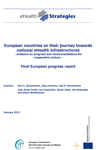
The summary report traces European countries' progress along the goals set out in the eHealth Action Plan. It focuses on the core applications of EHR-like/patient summary and ePrescription systems. It also analyses governance, structural and legal issues as well as policy lifecycle aspects.
Study results show that in virtually all European countries surveyed, political as well as stakeholder interest in eHealth policies, and the planning and implementation of national or regional infrastructures has strengthened considerably. This concerns not so much the number of new priority objectives identified, infrastructure elements tackled or pilots run, but rather the overall level of awareness, activities and concrete undertakings. EC as well as Member State initiated activities and co-operations like epSOS or the eHealth Governance Initiative have both significantly contributed to this state of affairs and are witness thereof.
As Pēteris Zilgalvis, Head of the EC's ICT for Health Unit commented, "Europe is experiencing a strong political momentum to advance eHealth solutions for the benefit of both its citizens and health systems. The recommendations for further actions submitted in this study are based on a thorough analysis of eHealth strategies and implementation activities in European countries as well as the results of a validation workshop in September 2010 in Brussels ... now the challenge is to cooperatively address the issues identified."
empirica Communication and Technology Research, with more than 20 years of experience in research on eHealth and telemedicine topics, coordinated the study. The Finnish partner institute THL (National Institute for Health and Welfare), legal specialists from the law firm Time.lex and Professor Denis Protti (University of Victoria, Canada), contributed domain expertise. The study's communication efforts and final validation workshop were supported by the communication agency EMC Consulting Group.
A host of experts as well as reviewers from the i2010 Subgroup on eHealth contributed their intimate knowledge of the eHealth situation in their respective countries and validated the content of the country reports. This comprehensive collection of country information constitutes a unique resource and important database of up to date evidence on eHealth progress across Europe, which updates and complements the results of the earlier eHealth ERA study of 2007.
Download European countries on their journey towards national eHealth infrastructures - evidence of progress and recommendations for cooperative actions (.pdf, 1.060 KB).
Download from eHealthNews.eu Portal's mirror: European countries on their journey towards national eHealth infrastructures - evidence of progress and recommendations for cooperative actions (.pdf, 1.060 KB).
For further information, please visit:
http://www.ehealth-strategies.eu